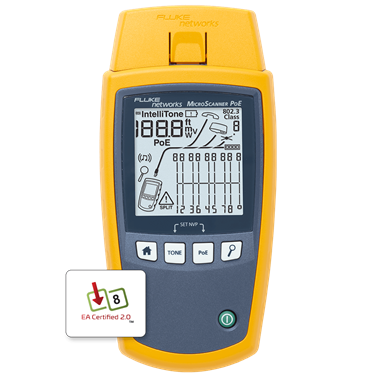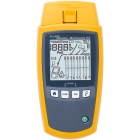Ethernet Alliance PoE Certification
10 de novembro de 2020 / General, Installation and testing
Ethernet Alliance Certifies the First Field Tester: MicroScanner PoE
With a diverse range of PoE implementations, users and installers are suffering difficulties in integrating PoE solutions. The Ethernet Alliance has developed a rigorous certification program to eliminate these problems. After successfully completing the Ethernet Alliance Gen2 PoE Certified program test plan, the Fluke Networks MicroScanner™ PoE is the first and only field tester certified for IEEE 802.3™ Power over Ethernet (PoE) interoperability.
Who is the Ethernet Alliance?
The Ethernet Alliance is a global consortium that includes system and component vendors, industry experts, university and government professionals who are committed to the continued success and expansion of Ethernet technology. The EA’s Gen 2 PoE Team is made up of leading suppliers of power-sourcing and powered devices, including Cisco, Aruba Networks (part of Hewlett-Packard Enterprise), Texas Instruments and Fluke.
Why a Certification Program?
While PoE provides substantial cost, efficiency and flexibility benefits, the term “PoE” is not trademarked, resulting in a wide variety of standardized and somewhat-standardized implementations that are not always interoperable. A recent survey by the Ethernet Alliance of over 800 installers, integrators and end users found that four of five respondents experienced difficulties in integrating PoE systems. After hearing of the certification program, more than three quarters expected certified devices to integrate more easily or perform better. A whopping 95% said it would positively affect their purchasing decision.
Certification Program Details
The program is based on the Ethernet Alliance Gen 2 PoE Test Plan, a 300-page document that outlines a series of tests for both Power Sourcing Equipment (PSE) and Powered Devices (PD). (the Gen 1 program was limited to lower power 802.3af/at devices, while Gen 2 adds 802.3bt which can provide to 90 watts.) These tests are designed to ensure that the devices are compliant with every requirement of the relevant IEEE standards.
The testing itself can be done in one of two ways. First, suppliers can equip their own lab with approved equipment and perform their own testing under supervision of the EA. This approach makes sense for vendors with a large number of different models to test. Second, the University of New Hampshire’s Interoperability Lab (UNH-IOL) is set up with the required equipment and can test products for a fee. This is the path we chose with the MicroScanner PoE.
Vendors in the program can label products which successfully pass these tests with the new “EA Certified 2.0” logos. Providing an unambiguous visual cue, the new certification logos clearly identify PSE and PD products, offering a high level of confidence of interoperability between existing and new PoE devices from multiple manufacturers.
What’s Changing in the MSPoE?
Nothing but the box. It turns out that the MSPoE was always fully compliant with the IEEE standards and passed the EA’s rigorous tests without changes. (This led to more high fiving and fist pumping than usual among our engineering team.) We are now authorized to label the product with the EA Gen 2 logo, but there’s not a lot of room or an easy way to do so, so we are not at this time. We will be using the logo in marketing materials such as the display box and as shown in the image above. And even though customers have expressed a willingness to pay more for a certified product, we aren’t increasing the price at this time.
What’s the benefit?
This certification provides confidence that the MicroScanner PoE will work properly with all IEEE-compliant devices. And as Fluke Networks is the only test vendor in the EA with portable products, we’re the only certified PoE field tester. Of course, we also designed the product to work with a wide variety of non-IEEE-compliant technologies, but since there’s no certification program for that, you’ll just have to take our word for it.
O MicroScanner PoE também fornece um conjunto completo de ferramentas para o técnico instalar dispositivos PoE e não PoE. Cable wire mapping, a built-in toner, and distance-to-fault indicators can track down cabling problems quickly. Quando conectada a uma porta de comutador viva, a unidade exibe a velocidade da porta até 10 Gbps, um recurso especialmente útil para resolver problemas de pontos de acesso lentos. Os identificadores de cabos podem ser usados para monitorar o posicionamento correto dos cabos.
Check out all the features of the MS-PoE here.







